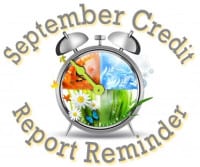Refinancing a mortgage is a big decision involving lots of questions that you need to think about. 
- How long do you plan on staying in the home?
- Why do you want to refinance?
- Do you just want a lower rate and/or shorter term?
- Do you want to take out cash to do something (home improvements, pay for kid’s college, etc.)?
These are some of the questions you need to think about to determine if refinancing is right for you.
For those of you that don’t remember, I was in the mortgage business for 10+ years. Well, lots has changed since I left the industry. So, we decided to refinance to a shorter term and a fixed rate. We had a 1-year adjustable rate with a Treasury bill index (a stable index) for the long term – they don’t offer that index anymore. We were dead set against getting a LIBOR index adjustable, as that index will be going away. For us, it had to be a shorter term and lower rate. Well, now was the time!
After answering all the above questions and more, we refinanced and shortened our term to 15 years with a fixed rate of 2.375%. The process was long, as the industry is overwhelmed. For us, we started the mortgage application process though closing took us 101 days. You’ll need your patience and to be organized with all your documents available. Much longer than I remember.
All in all this worked for us and it can for you too, with some patience.


 Are you tired of hearing about low mortgage interest rates? You’re not alone. Many of us have been thinking about it for a while now.
Are you tired of hearing about low mortgage interest rates? You’re not alone. Many of us have been thinking about it for a while now. For several years, we were planning this big vacation for this year. We would be visiting several European countries over the course of three weeks. Lots of time and efforts was put into the planning and coordinating with friends we would be seeing along the way. Enter 2020 and the pandemic, and we cancelled everything.
For several years, we were planning this big vacation for this year. We would be visiting several European countries over the course of three weeks. Lots of time and efforts was put into the planning and coordinating with friends we would be seeing along the way. Enter 2020 and the pandemic, and we cancelled everything. y people’s minds.
y people’s minds.
 Now if you are someone who has accumulated debt in 2020 (or previously), lets talk about ways to payoff your debt. You have heard the ads on the radio and see the commercials on TV, but are they legit? Maybe, but do you want to try and find out you have been scammed?
Now if you are someone who has accumulated debt in 2020 (or previously), lets talk about ways to payoff your debt. You have heard the ads on the radio and see the commercials on TV, but are they legit? Maybe, but do you want to try and find out you have been scammed? our fridge and freezer is a huge expense, that you probably weren’t expecting. Look into reimbursement from your renter’s / homeowner’s insurance (and possibly the power company) to ease your budget.
our fridge and freezer is a huge expense, that you probably weren’t expecting. Look into reimbursement from your renter’s / homeowner’s insurance (and possibly the power company) to ease your budget.